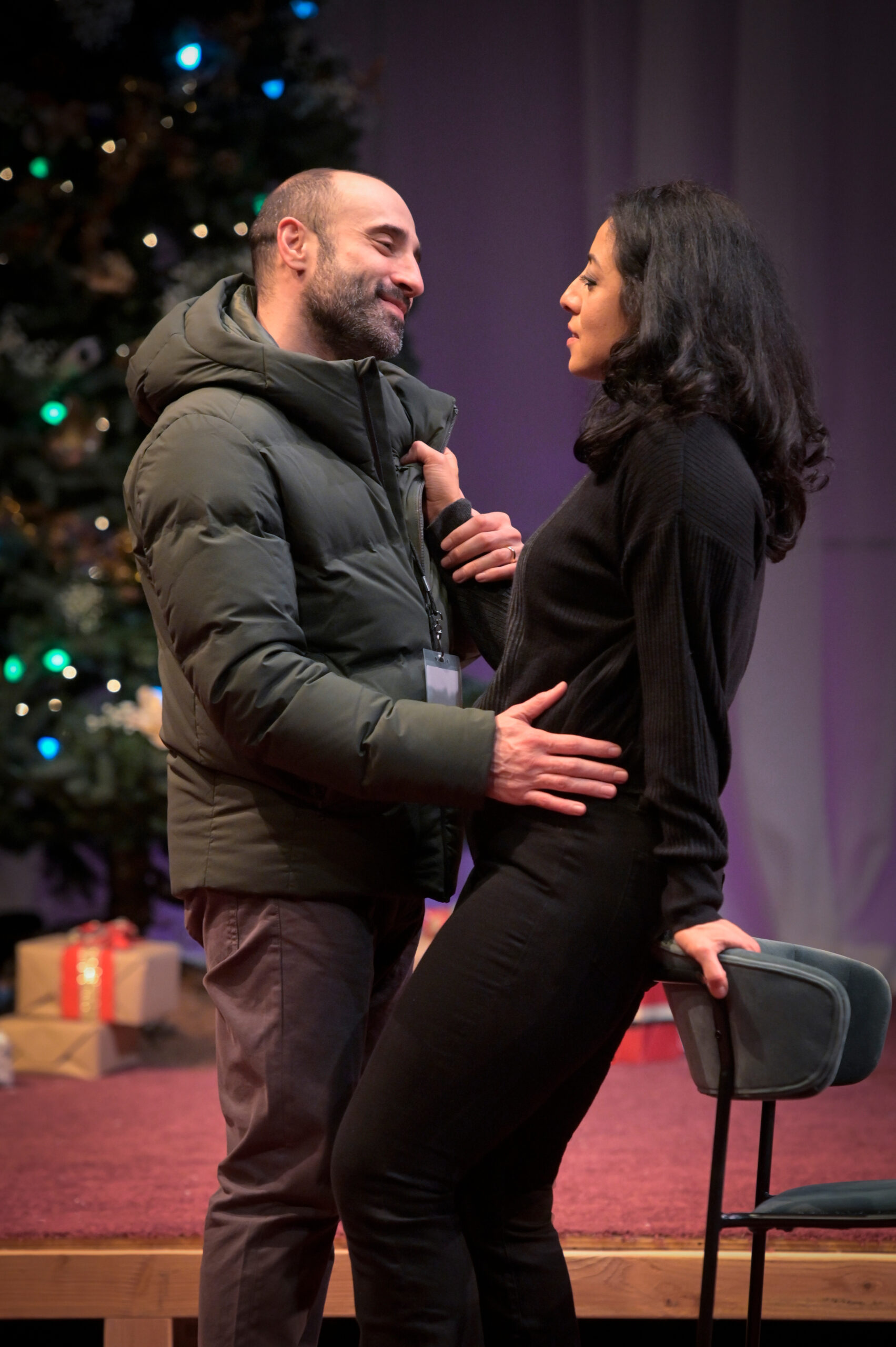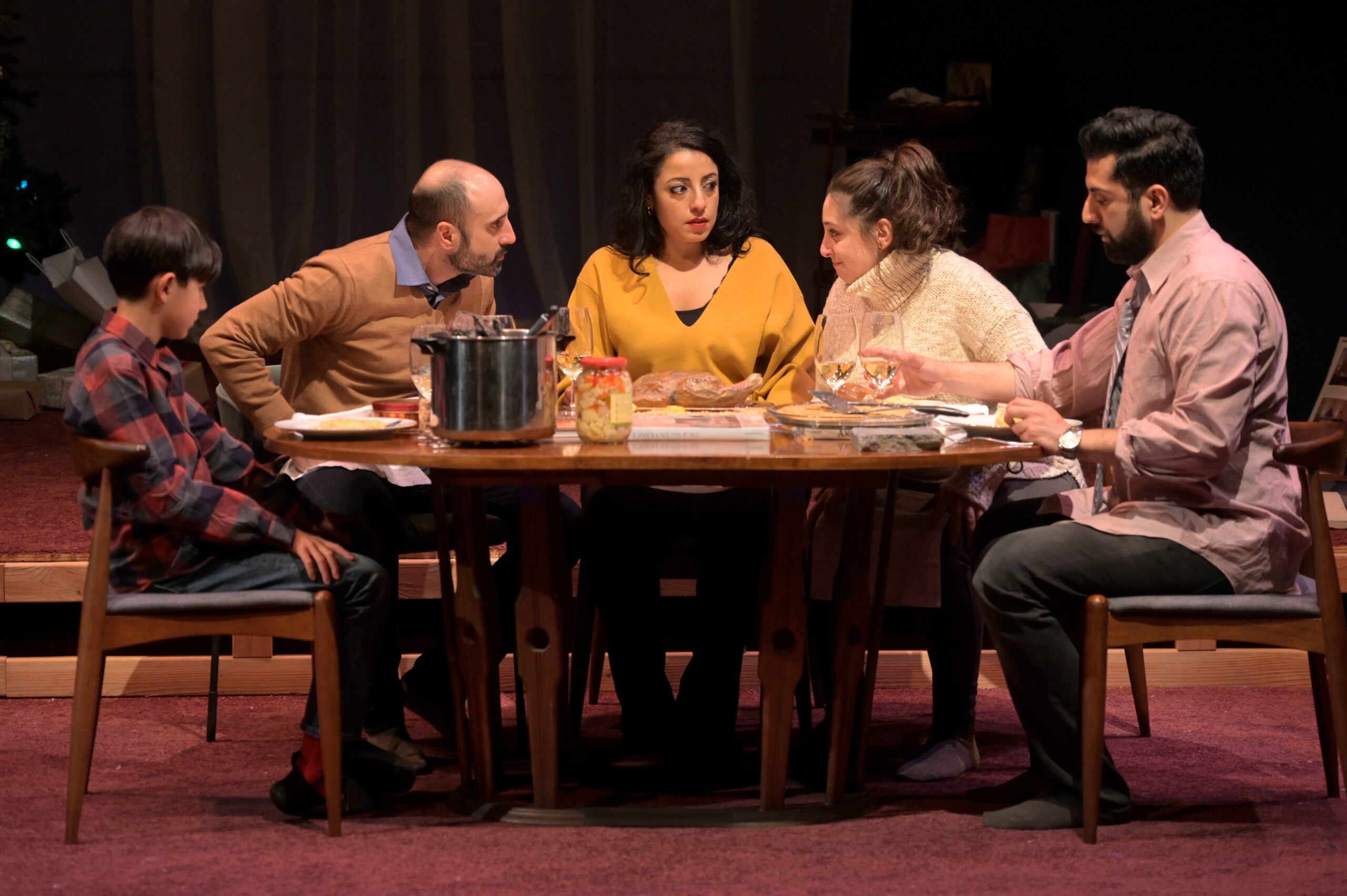
An Iraqi immigrant family finds a Christmas holiday gathering and promise of a bright future sullied by the momentum of the past in Heather Raffo’s “Noura,” at Marin Theatre Company through February 9.
Escapees from the destroyed city of Mosul, the family of three—Noura, her husband Tareq, and their young son Yazen—share a spacious New York City apartment, one decorated with an oversized Christmas tree but little else. Their space (set design by Adam Rigg) has the disheveled, semi-organized look of a temporary refugee camp, a reflection of Noura’s sense of disconnectedness despite the fact that her family has been in the US eight years, and has gained American citizenship and Anglicized names so that they might be better assimilated. Easier said than achieved, as this fascinating if uneven production proves over the course of its approximately ninety minutes.
The Christmas season is especially difficult for Noura (Denmo Ibrahim), who longs for the life she knew in her home city—family, friends, neighbors of multiple ethnicities and religions— an extended community that was destroyed in the wake of the US invasion. Tareq (Mattico David) is an emergency room physician who seems pretty much Americanized until confronted by the arrival of a holiday visitor, Maryam (Maya Nazzal), a fellow refugee they’ve been sponsoring who shares complicated ties to their past lives in Mosul. Her impending arrival is a source of anxiety for Noura as she makes preparations. A physics student in California, young Maryam hopes to land a job as a weapons designer with the US Department of Defense.
Ibrahim beautifully portrays her character’s abiding sense of loss and ambiguity . . .”
Maryam’s aspirations don’t seem to have any effect on Noura and Tareq, nor on their doctor friend Rafa’a (Abraham Makany), also an exile from Mosul, but the fact that she is unmarried and pregnant—both by choice—throws Tareq into a tailspin. An independent young woman with no apparent need for a man is a situation he simply can’t cope with: thousands of years of macho Arab culture upended by one modern independent feminist, resounding proof that they’ve left the old world behind. The emotional repercussions from this and other conflicts resonate off the stage and into the audience as the four adults and one boy (Valentino Herrera) struggle to make the holiday a pleasant one.

All four adult actors are excellent. Ibrahim and David in particular are able to mine emotional nuances that actors with lesser skills might not manage. Some of their dramatic expertise must certainly be the work of director Kate Bergstrom, but there are holes in the story that detract from its intended effect. Why, for example, do these Iraqi-Americans not raise even one word of dismay over Maryam’s stated career agenda, when their entire country was demolished by high-tech weaponry and the medieval mentality behind it? Tareq must make a decent income from his emergency room work, but they still can’t afford some basic furniture? Then there are Noura’s recurring smoke-filled reveries of the life she once knew, with no counterbalancing embrace of the future’s potential.
Noura lives in limbo between then and now, unable to let go and unwilling to move on. It’s a heartbreaking situation, the immigrant’s plight, one not understood by Americans intent on “reaching closure” as quickly and painlessly as possible. Ibrahim beautifully portrays her character’s abiding sense of loss and ambiguity, repeated several times with minor variations in the extended final scene. Playwright Raffo might better have chosen one powerful statement and let the curtain fall, rather than hammer the audience with what they’ve already learned is Noura’s unhappy truth. Not that the story needs to be tied up in a tidy little bundle of happy-ever-afterness, but a clear ending would enhance the play’s impact.
 Barry Willis is the Executive Editor at Aisle Seat Review, a member of the American Theatre Critics Association, and president of the San Francisco Bay Area Theatre Critics Circle. Contact: [email protected]
Barry Willis is the Executive Editor at Aisle Seat Review, a member of the American Theatre Critics Association, and president of the San Francisco Bay Area Theatre Critics Circle. Contact: [email protected]
| Production | Noura |
|---|---|
| Written by | Heather Raffo |
| Directed by | Kate Bergstrom |
| Producing Company | Marin Theatre Company (MTC) |
| Production Dates | Through February 9th |
| Production Address | Marin Theatre Company 397 Miller Avenue Mill Valley, CA |
| Website | www.marintheatre.org |
| Telephone | (415) 388-5200 |
| Tickets | $25 – $70 |
| Reviewer Score | Max in each category is 5/5 |
| Overall | 3.5/5 |
| Performance | 4/5 |
| Script | 3/5 |
| Stagecraft | 3.5/5 |
| Aisle Seat Review PICK? | ----- |
